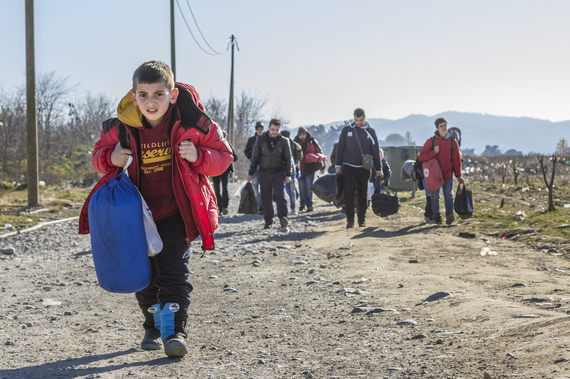Donald Trump may be the first presidential candidate since George Wallace in 1968 to frame wholesale discrimination against a group of people as a campaign promise. It is shocking for a candidate to refer to families seeking refuge from war and persecution as "a 200,000-man army" or an ISIS "Trojan horse" hatching "one of the great military coups of all time," and remain the frontrunner of a major political party. But Trump is not alone. Over the past year, politicians in the US and Europe have publically called refugees and asylum-seekers rabid dogs, swarms and marauders.
Discrimination against displaced people is not limited to Europe and the U.S. of course, and it extends well beyond hateful political rhetoric. In truth, millions of refugees around the world face discrimination and the fear behind it on a daily basis. This has critical implications not only for security and stability in refugee-receiving (and refugee-rejecting) nations, but for population health and economic growth as well.
According to UNHCR, the UN agency mandated with the care and protection of refugees, worldwide displacement has hit an all-time high. Its 2014 estimate of 59.5 million people living in a state of forced displacement means 22 million more people fleeing war and persecution than just a decade ago. Making matters worse, 86 percent of refugees are hosted in developing countries, usually in the Middle East and Africa, with often high unemployment rates, large underserved populations at home, and mixed human rights records.
These conditions not only interfere with the host government's ability to resource quality basic services for refugees but can also result in overtly discriminatory policies and practices by the very authorities charged with safeguarding refugees. In Turkey, for example, the world's largest host of refugees, Amnesty International recently reported mass detention, ill treatment, and illegal deportation of Syrian refugees and asylum-seekers. In Pakistan, the second largest refugee host country, Human Rights Watch exposed a pattern of police abuse and other forms of violent discrimination against Afghani refugees and asylum-seekers. Aside from blatantly violating international law, these practices endanger refugee lives by exposing them to repeated physical and psychosocial stress, cutting off access to care, and altogether upsetting delicate processes of healing.
More insidious forms of discrimination can involve restricting freedom of movement outside of camps, limiting employment rights, or denying the expression of religious identity, such as wearing hijabs. Host governments may also neglect to provide refugees and asylum-seekers with identity documents, such as birth and marriage certificates, which can be needed to access healthcare and apply for jobs, and which may be required for children of refugees to return home.
Of course, discrimination goes well beyond official policy, finding expression among employers, service providers, neighbors, and classmates. In a recent study I conducted with colleagues in Uganda, for example, adolescent refugees from the Democratic Republic of Congo and Somalia reported being neglected and underestimated by educators, being prevented from playing with their Ugandan peers, and even receiving death threats from other Ugandan adolescents.
It is no wonder then that these adolescents suffered from abnormally low self-worth, and tended to withdraw from school, sometimes drifting towards the streets. As is often the case in stigmatizing environments, caretakers reported feeling discouraged from seeking help for their children. This sheds some light on the well-documented association between discrimination, depression, and other symptoms of psychological distress. Discrimination has also been linked to physical health conditions including hypertension, self-reported poor health, and breast cancer, as well as risk factors for disease, such as obesity, high blood pressure, and substance use.
Much of this discrimination likely has to do with the fear that refugees may take jobs away from host country populations. The reality is much more complex, however. While the influx of populations may stress local economies, properly integrated refugees can also represent new markets for goods and services, replenish aging populations, increase tax revenues, and fill unmet demand for labor. Systematically excluding refugees from the formal economy wastes a significant opportunity, while adding more stress to families and protracting dependency on aid.
The other big fear that feeds discrimination is the one I opened with. Branding refugees as potential terrorists is inflammatory and divisive, and can encourage the stigmatization of other identity groups, such as Muslims. It is too easy to note here that, just weeks after Hillary Clinton called Donald Trump "ISIS' best recruiter," he cropped up in a terrorist recruitment video. This is no coincidence — the purpose of terrorism is to spread fear, because fear, and the behavior it promotes, corrodes the trust that is fundamental to an open society.
Vilifying those with the most to fear — refugees — is not fighting terror, but buying into it. A true security approach would focus more on the capabilities of refugees to contribute economically, culturally, and intellectually to the countries that keep them safe and healthy, as they have throughout history.

